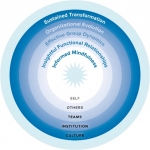Integrative Healthcare Leadership Program at Duke University: A First-Hand Experience Report
September 27, 2016
by John Weeks, Publisher/Editor of The Integrator Blog News and Reports
Adam Perlman, MD, MPH is a clinician, researcher and educator who runs Duke Integrative Medicine and is the central organizer of the Leadership Program in Integrative Healthcare at Duke University, where he and his team chose to include me as faculty. I’ve just returned from a mid-September presentation at one of the program’s onsite gatherings where I stuck around for a second day to participate and learn as a student. Terrific experience! Here is a brief report. When I first heard of the plans for the program, I doubted whether the program would attract a sufficient cohort. I was wrong. The program, which is now accepting nominations for the February 2017 kick-off of its 3rd class, typically receives over 100 applicants each year for its 30 slots. Those selected are a diverse lot. I quickly met a medical oncologist, a nursing dean, a licensed acupuncturist, a program administrator, a primary care doctor, a physical therapist, an obstetrician - and the list goes on. The common denominator was a shared passion to gain new skills to engage projects as change agents. My guess is that the program’s magnetism comes more from the reputations of the leaders than the sponsor, Duke, or the course description. Anyone following the efforts to implant the integrative model in mainstream payment and delivery will recognize this team:
When I first heard of the plans for the program, I doubted whether the program would attract a sufficient cohort. I was wrong. The program, which is now accepting nominations for the February 2017 kick-off of its 3rd class, typically receives over 100 applicants each year for its 30 slots. Those selected are a diverse lot. I quickly met a medical oncologist, a nursing dean, a licensed acupuncturist, a program administrator, a primary care doctor, a physical therapist, an obstetrician - and the list goes on. The common denominator was a shared passion to gain new skills to engage projects as change agents. My guess is that the program’s magnetism comes more from the reputations of the leaders than the sponsor, Duke, or the course description. Anyone following the efforts to implant the integrative model in mainstream payment and delivery will recognize this team: -
 Perlman founded one of the early delivery organization-based integrative centers at St. Barnabas in New Jersey. He’s published widely-cited integrative research and has been drawn by Duke into a system-wide initiative to enhance well-being. Perlman and Kligler, below, have each served as chair of the influential Academic Consortium for Integrative Medicine and Health.
Perlman founded one of the early delivery organization-based integrative centers at St. Barnabas in New Jersey. He’s published widely-cited integrative research and has been drawn by Duke into a system-wide initiative to enhance well-being. Perlman and Kligler, below, have each served as chair of the influential Academic Consortium for Integrative Medicine and Health. - Lori Knutson, RN, BSN, HNB-BC is the professional who built and managed the most significant inpatient-outpatient integrative initiative in the country, at Allina Health. She also brings into the room her current system-wide role at Meridian Healthcare.
- Benjamin Kligler, MD, MPH is another pioneering integrative clinic developer and then vice chair of one of the first integrative medicine departments in a major delivery organization. A widely published researcher and educator, Kligler’s mentoring is also infused by learning in his new role as clinical leader for the nationwide integrative care initiative in the Veteran’s Health Administration.
- Integrative health veteran Bonnie Horrigan, the publisher in 1996 of one the first peer-reviewed journals in the field, is the former executive director of the Bravewell Collaborative.
 At its core, are the concepts of mindfulness and mindful leadership. One of the treats of remaining onsite as a student was to observe the facilitation in such practices by Michael Aquilino. Aquilino’s extensive background in business, including 20 years of intimate engagement is decision processes as an executive coach, adds depth and precision to his counsel. One my second day, with the whole cohort witnessing, he took each member through an in-depth check-in. Each landed on a key issue they are facing, while the rest of us were engaged with multiple scenarios that evoked parallel experiences and learning. The mind-body training was enhanced by hour-long experiential sessions that started the day as well as a guest lecture from nationally renowned mindfulness and resilience educator Adi Haramati, PhD. For the leadership training, practical skills building is paramount. The culmination of each person’s participation is the completion of a project that will help them with the on-the-ground change initiative each selected. Projects include such things as a build out of integrative services in an inpatient or outpatient environment, and development of strategies for changing the payment system. To support success, each participant is assigned a mentor from Duke’s Fuqua School of Business to assist them with their selected project. Throughout the second day of the retreat, small groups of the participants left the room to meet one-on-one with their mentors. Comment: One fascinating part of the check-in process brought to mind the way that couples counseling can lead to clarity that divorce is the only option. For 3 of the participants, the depth work in connecting with a deeper sense of purpose, and a growing mindful awareness of what they seek to do as change agents, led to the same major decision: they quit their jobs. I felt, in listening in, that the 90% who were staying put were also taking their work as seriously. It was heart-warming – amidst so much challenging news in medicine – to think of each of these as pebbles sending out their mindful ripples into one and another of the myriad bays and inlets of the great disturbed pond of the US medical industry.
At its core, are the concepts of mindfulness and mindful leadership. One of the treats of remaining onsite as a student was to observe the facilitation in such practices by Michael Aquilino. Aquilino’s extensive background in business, including 20 years of intimate engagement is decision processes as an executive coach, adds depth and precision to his counsel. One my second day, with the whole cohort witnessing, he took each member through an in-depth check-in. Each landed on a key issue they are facing, while the rest of us were engaged with multiple scenarios that evoked parallel experiences and learning. The mind-body training was enhanced by hour-long experiential sessions that started the day as well as a guest lecture from nationally renowned mindfulness and resilience educator Adi Haramati, PhD. For the leadership training, practical skills building is paramount. The culmination of each person’s participation is the completion of a project that will help them with the on-the-ground change initiative each selected. Projects include such things as a build out of integrative services in an inpatient or outpatient environment, and development of strategies for changing the payment system. To support success, each participant is assigned a mentor from Duke’s Fuqua School of Business to assist them with their selected project. Throughout the second day of the retreat, small groups of the participants left the room to meet one-on-one with their mentors. Comment: One fascinating part of the check-in process brought to mind the way that couples counseling can lead to clarity that divorce is the only option. For 3 of the participants, the depth work in connecting with a deeper sense of purpose, and a growing mindful awareness of what they seek to do as change agents, led to the same major decision: they quit their jobs. I felt, in listening in, that the 90% who were staying put were also taking their work as seriously. It was heart-warming – amidst so much challenging news in medicine – to think of each of these as pebbles sending out their mindful ripples into one and another of the myriad bays and inlets of the great disturbed pond of the US medical industry.



















SHARE